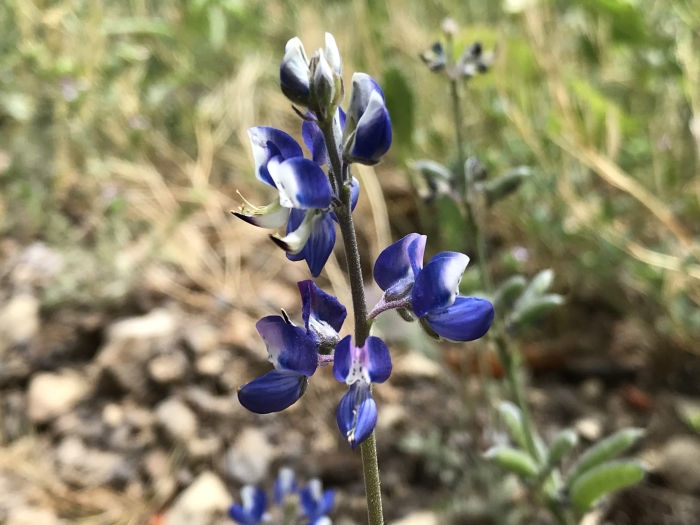Miniature Lupine
(Lupinus bicolor)
Miniature Lupine (Lupinus bicolor)
/
/

rappman
CC BY 4.0
Image By:
rappman
Recorded By:
Copyright:
CC BY 4.0
Copyright Notice:
Photo by: rappman | License Type: CC BY 4.0 | License URL: http://creativecommons.org/licenses/by/4.0/ | Rights Holder: rappman | Publisher: iNaturalist | Date Created: 2019-05-10T21:47:29Z |

















































Estimated Native Range
Summary
Lupinus bicolor, commonly known as Miniature Lupine, is an annual herb that is native to a variety of habitats including open grasslands, chaparral, and open woodlands in the Pacific West of North America, particularly California. It typically grows to a height and width of approximately 1 foot. Miniature Lupine has a short, hairy stem and sports thin, palmately-arranged leaves. The inflorescence is modest for a lupine, reaching up to 8 centimeters (3.1 inches) tall, with flowers that are usually bicolored. One color is often a deep blue, while the other may be white, light purple, or magenta, sometimes featuring small speckles or spots on the petals. The plant produces small, hairy pods that are only a few centimeters long, containing tiny brownish seeds.
Miniature Lupine is valued for its ornamental qualities, including its vibrant two-toned flowers. It is often used in native plant gardens, drought-tolerant landscapes, wildlife gardens, and for habitat restoration projects due to its low water requirements and ability to thrive in soils with fast drainage. The plant is particularly beneficial to pollinators, such as native bees and bumblebees, and has been shown to increase the abundance of the native Yellow-faced bumblebee (Bombus vosnesenskii) in restoration sites. When cultivating Miniature Lupine, it is important to provide full sun exposure and to avoid overwatering to mimic its natural dry habitat conditions.CC BY-SA 4.0
Miniature Lupine is valued for its ornamental qualities, including its vibrant two-toned flowers. It is often used in native plant gardens, drought-tolerant landscapes, wildlife gardens, and for habitat restoration projects due to its low water requirements and ability to thrive in soils with fast drainage. The plant is particularly beneficial to pollinators, such as native bees and bumblebees, and has been shown to increase the abundance of the native Yellow-faced bumblebee (Bombus vosnesenskii) in restoration sites. When cultivating Miniature Lupine, it is important to provide full sun exposure and to avoid overwatering to mimic its natural dry habitat conditions.CC BY-SA 4.0
Plant Description
- Plant Type: Herb
- Height: 0.3-1 feet
- Width: 0.3-1 feet
- Growth Rate: Moderate
- Flower Color: Blue, Purple
- Flowering Season: Spring
- Leaf Retention:
Growth Requirements
- Sun: Full Sun
- Water: Low
- Drainage: Fast
Common Uses
Bee Garden, Bird Garden, Butterfly Garden, Deer Resistant, Drought Tolerant, Hummingbird Garden, Low Maintenance, Rabbit Resistant, Showy Flowers
Natural Habitat
Open grasslands, chaparral, and open woodlands in the Pacific West, particularly California
Other Names
Common Names: Lindley’s Annual Lupine , Pigmy-Leaved Lupine , Bicolored Lupine , Lupin Bicolore , Bicolor Lupine
Scientific Names: Lupinus bicolor , Lupinus bicolor var. bicolor
GBIF Accepted Name: Lupinus bicolor Lindl.